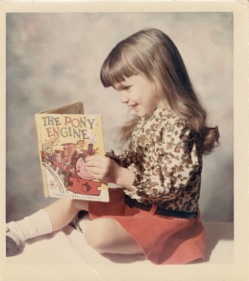
He’s a smart guy, that kid, with all the splendor and arrogance that thin, young people naturally possess. But I was ready for him.
“Wrong!” I snapped, stabbing one of my meatballs with a fork, my famous meatballs that have been inspiring shock and awe for nearly three decades. “How these meatballs smell and taste cannot be found on the internet.”
“Mo-om,” the young man whined, rolling his eyes. “Of course there are no smells or tastes on the web, but everything else is there.”
“What was the name of that kid who sat next to me in seventh-grade science?” I asked. “The one who smelled like Listerine? He moved to Utah after Christmas and no one could ever remember his name.”
“I’m sure he has a Facebook page.”
“Why does my car make that weird noise when I downshift?”
“Google it and find out.”
“Was my grandmother good at math?”
“Are you guys about done or should I just leave?” my husband asked with a sigh.
“Face it, Mom,” the scion asserted. “Whatever can’t be found on the internet is of no significance.”
My husband left the room as I glared at the kid in sharp disapproval.
But even though I disagreed with him, I couldn’t help recalling a story I’d heard the week before on NPR. It was about a couple of amateur historians, the Bowery Boys, who create podcasts about New York City’s history. The report included a quote from a listener who said he was so grateful to learn about the short-lived Bronx amusement park Freedomland USA. His parents had taken him there when he was a kid, but no one he knew had ever heard of the place, and he’d begun to think he’d made the whole thing up.
It was a sweet anecdote within a sweet story, but my callous reaction at the time had been, “Why didn’t you just Google it?”
And as much as the man seemed gratified to gain the knowledge that Freedomland had really existed, I believe he also lost something that day. He lost a dreamy mental pursuit, a hazy recollection that had nothing but its own threads to weave into an imperfect tapestry of memory. I felt sorry for him.
But nowadays we experience this sort of casual loss all the time.
You’re sitting around a table with friends, a couple bottles of Cabernet past dessert, when the Beatles song “Across the Universe” comes up in the music shuffle and you all try to make sense of that weird line John Lennon sings before “Nothing’s gonna change my world…”
“Isn’t it ‘Jack and you, the day is long’?” one guest posits.
“No, it’s ‘I who knew,’ and then there’s some Indian word,” claims another.
“I always thought…” you begin, but before you can gush about your theory, someone—usually the youngest person at the table—states definitively, “Jai guru deva om” and, without breaking eye contact with his smart phone, adds, “It means ‘I give thanks to Guru Dev,’ or possibly ‘victory to God divine’.” And everyone pretends to be relieved.
Or you’re on a train, telling your four-year-old nephew about, say, the Loch Ness monster, and as you try to straighten out the details, a dude with floppy hair leans in from the seat behind and rattles off the Wikipedia explanation of Nessie that he just searched because he can’t help listening to other people’s business and evidently your ignorance was really bothering him, like the way smoking used to bother people.
Yeah, I know this makes me sound like a Luddite, or a mouth-breather, or at best a silly ninny who reveres ignorance. But I am none of these things. I just miss something that the internet has largely robbed me of: I miss wondering.
Wondering is not simply a state of not knowing; it is an creative state of longing to know. When you try to piece together a long lost experience, or recall some obscure fact, you’re on a sort of quest. You leave behind the mundane, fact-based world and enter an essentially child-like place of…well, wonder.
But this state is rare nowadays, and one that can make you feel foolish. Why sit around wondering how high the Eiffel Tower is, or who won Best Actress in 1979, or who Ross Perot’s running mate was? It’s all out there, just a click away.
As I see it, we are left with three options: Experience natural curiosity and seek out fun facts all day; ignore natural curiosity to avoid seeking out fun facts all day; or wonder only about those things that can produce no search results.
I’m opting for the latter. From now on, I will only wonder about true imponderables, such as, Why does anyone like white chocolate? Why is my brother a Republican? Why is my right butt cheek fatter than my left?
And until my son concedes that there might be some information that both matters and cannot be found on the internet, I’ll be keeping all the meatballs for myself.




 RSS Feed
RSS Feed
